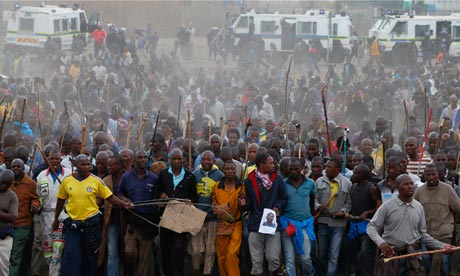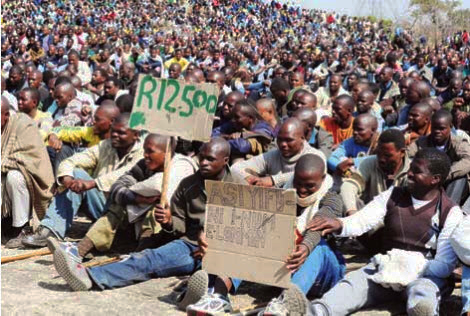South Africa
South Africa: Dying for growth -- World Bank's role in Marikana massacre mine, carbon pollution

More than 3000 mineworkers take part in a march at Lonmin's Marikana mine in South Africa on September 5, 2012. Photograph by Mike Hutchings/REUTERS.
For more on the Marikana mine massacre, click HERE.
By Patrick Bond
September 5, 2012 -- Links International Journal of Socialist Renewal -- “One of the things you learn as an anthropologist, you don’t come in and change the culture”, Dartmouth College president Jim Yong Kim told wealthy alumni when contemplating the institution’s notorious hazing practices, prior to US President Barack Obama’s request last February that he move to the World Bank.
Kim’s Harvard doctorate and medical degree, his founding of the heroic NGO Partners in Health and his directorship of the World Health Organization’s AIDS division make him the best-educated, most humane World Bank president yet. A decade ago, he co-edited the book, Dying for Growth, pointing out that "Washington Consensus" policies and projects had a sharply adverse impact on health.
The Democratic Left Front's Vishwas Satgar interviewed on the Real News Network, August 31, 2012. Transcript below DLF statement. More at The Real News.
STOP PRESS, September 2, 2012 -- Following national and international outrage, South African prosecutors have provisionally dropped murder charges against 270 miners whose 34 colleagues were massacred by police. Acting national director of prosecutions for the National Prosecuting Authority (NPA) Nomgcobo Jiba said that after having sought an explanation from the department's lead prosecutors, she had taken the decision to review the charge.
A final decision would be taken on the charges after a series of investigations into the shootings had delivered their findings. The workers have been held in custody since they were arrested on the day of the shooting -- August 16 -- at Lonmin's mine in Marikana, northwest of Johannesburg. Courts will start releasing them after police verify their addresses. The first batch of at least 140 miners is due to be freed on September 3 while the rest should go home on September 6.
South Africa: Marikana massacre – a turning point?

Marikana mineworkers on strike for higher pay.
For more coverage of South Africa, click HERE.
By Martin Legassick
August 27, 2012 – Links International Journal of Socialist Renewal -- The massacre of 34, and almost certainly more, striking mineworkers at Marikana (together with more than 80 injured) on August 16 has sent waves of shock and anger across South Africa, rippling around the world. It could prove a decisive turning point in our country’s post-apartheid history.
Marikana is a town situated in barren veld, dry brown grass in the winter, with occasional rocky outcrops (kopjes, hillocks). The Lonmin-owned mines – there are three, Karee, West and East Platinum – are situated on the outskirts of the town. Alongside two of them is a settlement of zinc-walled shacks festooned with lines of washing called Enkanini, where most of the mineworkers live.
South Africa: 'Sorting fact from fiction at Marikana' -- Terry Bell on the massacre of mineworkers

For more coverage of South Africa, click HERE.
August 27, 2012 -- Terry Bell is a widely respected labour reporter and activist based in Cape Town, South Africa. His "Inside labour" columns in Amandla! magazine and on his blog, Terry Bell Writes, are essential reading for those interested in developments in South Africa's labour movement. Below, with Terry Bell's permission, Links International Journal of Socialist Renewal posts some of his recent columns dealing with Marikana massacre and the background to it.
* * *
By Terry Bell
August 23, 2012 -- Terry Bell Writes -- The deaths at Lonmin amount to the bloodiest tragedy of the post-apartheid era. As a result, the blame game is in full swing and is likely to continue in the weeks ahead.
South Africa: (updated Aug. 29) Justice now for the Marikana workers and community!

August 24, 2012 – In the aftermath of the t
South Africa: The massacre of our illusions … and the seeds of something new
By Leonard Gentle, director of the International Labour Research and Information Gro
South Africa: The ANC's 'second transition' to what?

By Vishwas Satgar, Johannesburg
July 13, 2012 -- Amandla! --The African National Congress (ANC), South Africa's ruling party for almost two decades, held a policy conference in June. There are many ideas and policy perspectives up for discussion but the "big idea" framing the discussion is captured in a 47-page long document entitled: The Second Transition? Building a National Democratic Society and the Balance of Forces in 2012.
South Africa: Who will surf the protest wave?

Johannesburg's Orange Farm revolts against local elites.
By Patrick Bond
July 17, 2012 -- Links International Journal of Socialist Renewal -- The recent surge of unconnected community protests across South Africa confirms the country’s profound social, economic and environmental contradictions. But if activists fall before a new hail of police bullets, or if they lack an overarching, unifying political strategy, won’t their demonstrations simply pop up and quickly fall back down again – deserving the curse words "popcorn protests" – as they simply run out of steam, or worse, get channelled by opportunists into a new round of xenophobic attacks?
It’s been a hot winter, and we’re just halfway through July (the Centre for Civil Society’s Social Protest Observatory keeps tabs at http://ccs.ukzn.ac.za). Consider evidence from just the past two weeks, for example, in Johannesburg’s distant Orange Farm township south of Soweto, where residents rose up against city councillors and national electricity officials because of the unaffordable $250 installation charged for hated pre-payment (i.e. self-disconnection) meters, not to mention a 130% increase in electricity prices.
South Africa's Democratic Left Front: 'Solidarity with the women and workers of Greece'
Statement by the Democratic Left Front (South Africa)
July 2, 2012 -- The Democratic Left Front (DLF – South Africa) expresses its full solidarity with the women, workers, progressive mass movements and the SYRIZA party of Greece as they face the deep effects of the EU-inspired austerity onslaught. The Greek austerity plan involves cuts of 11.6 billion euros ($14.5 billion) by 2014. This amount will come from brutal cuts in budgets for health, wages and pensions. It will also mean hundrends of thousands of job losses in the Greek public sector. This austerity plan is meant to make the workers and the poor pay.
South African workers and unemployed people have faced a similar onslaught for the last 18 years under neo-liberal African National Congress (ANC) rule.
In the June 17 elections, the anti-austerity SYRIZA (Coalition of the Radical Left) came a close second with 26.9% of the vote. The right-wing New Democracy won the elections with more than 29%, amid huge blackmail and threats from major European governments and financial institutions.
‘Closing the doors of learning’ to the Israeli state opens the doors of freedom

By Patrick Bond and Muhammed Desai
